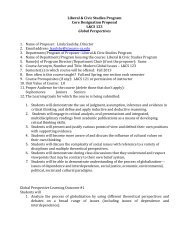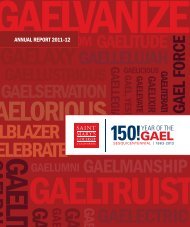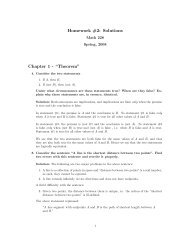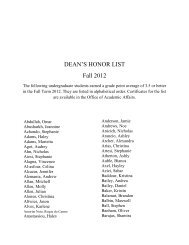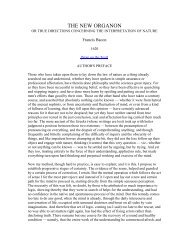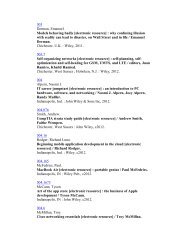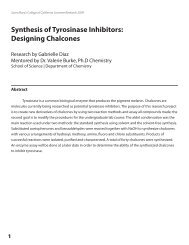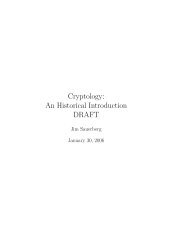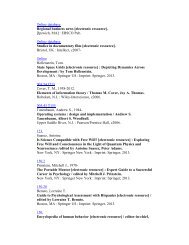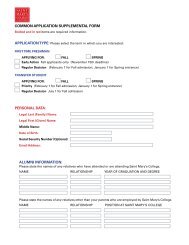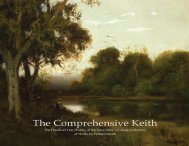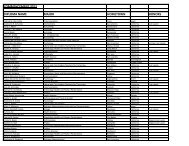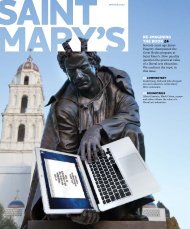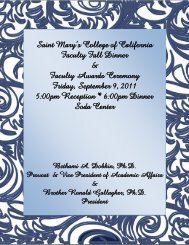Philosophy CurriculumMajor RequirementsLower DivisionPhilosophy 10 or 11 is required <strong>of</strong> all students.Upper DivisionThe major in philosophy requires eight upper-division courses. The130-131 and 135-136 sequences are required <strong>of</strong> all majors. In addition,all majors elect at least one course from Philosophical Topics: 108, 1<strong>09</strong>,110, 111, 113, 114, 115, 116, 117, 118, 133, 134, and from Authors/Schools: 160, 170, 172, 174, 176, 178, and elect one further coursefrom either category or undertake an approved 197 Special Study or199 Honors course. In the senior year, candidates for the degree undertakean approved 196/198 Senior Thesis.Majors planning graduate study are advised to take French or German(for study in modern philosophy), Latin (for study in medieval philosophy),or Greek and Latin (for study in classical philosophy).Minor RequirementsThe minor in philosophy requires one lower (10 or 11), and four upperdivisioncourses (the 130–131 sequence or the 135–136 sequence,and one course from each <strong>of</strong> the categories, Philosophical Topics andAuthors/Schools).Prerequisite GradeAny course listed in this department with a prerequisite assumes a grade <strong>of</strong>C– or better in the prerequisite course.C o u r s e sLower Division5 Practical LogicA course in the analysis and evaluation <strong>of</strong> everyday arguments. Recognition<strong>of</strong> patterns <strong>of</strong> argumentation, fallacies, and ambiguities in English is stressed.This course aims primarily at refining and disciplining the student’s naturalability to think critically. May not be counted for major credit.10 Plato and Philosophical InquiryStudy <strong>of</strong> Plato’s Republic or <strong>of</strong> selected Platonic Dialogues with a view to suchquestions as: What is philosophy? What is the act <strong>of</strong> philosophical inquiry?What makes for a philosophical question, or for a philosophical answer?11 Aristotle and Philosophical MethodStudy <strong>of</strong> selected texts <strong>of</strong> Aristotle with a view to such questions as:What are the objects, and associated methods, <strong>of</strong> philosophical inquiry?Are there distinct kinds or divisions <strong>of</strong> philosophy? In what sense orsenses may philosophy qualify as science?Upper DivisionPhilosophical Topics110 Philosophy <strong>of</strong> ReligionA phenomenological study <strong>of</strong> man which seeks to discover the essentialstructure <strong>of</strong> the human phenomenon <strong>of</strong> religion through its variousmanifestations. Consideration is given to the ultimate meaning <strong>of</strong> humanexistence and those common principles rooted in man which give riseto religion. The orientation <strong>of</strong> the course is philosophical and considersreligion as involving both man and God.111 Philosophy <strong>of</strong> ArtAn analysis <strong>of</strong> doing and making, <strong>of</strong> truth, good, beauty, the visible andinvisible, <strong>of</strong> figure and finality, as these reveal the intellectual and spiritualuniverses disclosed by painters, sculptors, poets, etc.113 Contemporary Problems in EthicsA study <strong>of</strong> the ethical aspects <strong>of</strong> such contemporary problems as personalfreedom, personal rights, civil disobedience, and situation ethics.114 Philosophy <strong>of</strong> LawA study <strong>of</strong> the philosophy <strong>of</strong> law from Sophocles’ Antigone throughthe great thinkers <strong>of</strong> the Middle Ages, giving particular attention to thenotion <strong>of</strong> natural law <strong>of</strong> Thomas Aquinas.115 Modern Legal PhilosophyThe philosophy <strong>of</strong> law from Thomas Hobbes and John Locke to Marxismand contemporary legal positivism.145
Curriculum Philosophy116 Political PhilosophyAn investigation <strong>of</strong> the philosophical development <strong>of</strong> the notion <strong>of</strong> the“state,” “man’s relationship to the state,” and “forms <strong>of</strong> government.”117 Philosophy <strong>of</strong> NatureRaises the question <strong>of</strong> the possibility <strong>of</strong> a knowledge <strong>of</strong> nature whichis independent <strong>of</strong> the quantification and mathematical methods <strong>of</strong> the“physical” sciences.118 Theory <strong>of</strong> KnowledgeA study <strong>of</strong> the human approach to the nature <strong>of</strong> being, through ananalysis <strong>of</strong> the works <strong>of</strong> Sartre, Descartes, Kant, Hegel, Aristotle, andThomas Aquinas. Particular emphasis on the philosophical method andthe practice <strong>of</strong> reflection.130 –131 EthicsAn investigation <strong>of</strong> the difference between good and evil and betweenvirtue and vice; <strong>of</strong> the relationship <strong>of</strong> virtue to choice, to knowledge, topower, to pleasure, to happiness; <strong>of</strong> the relationship <strong>of</strong> the humanperson to God, to nature, to society; <strong>of</strong> the relationship <strong>of</strong> responsibilityto freedom and necessity. Texts (130) by Plato and Aristotle, the Bible,and Aquinas and (131) by Machiavelli, Hobbes, Locke, Rousseau, Hegel,Kant and Nietzsche. Philosophy 130 is prerequisite to 131.133 The Art <strong>of</strong> LogicA study <strong>of</strong> classical logic with reference to primary texts. Logic is approachedas the art <strong>of</strong> attending to and refining the acts <strong>of</strong> the discursive intellect —definition, predication, and argument (reasoning — in its coming to know).Among the major topics considered: signification, categories, predicables,categorical and complex propositions, syllogistic, induction, formal andinformal fallacies.135 –136 MetaphysicsA study, through close reading, discussing and writing, <strong>of</strong> “metaphysical”texts <strong>of</strong> (135) Plato and Aristotle (and, through them, <strong>of</strong> Parmenides andHeraclitus); and (136) <strong>of</strong> Thomas Aquinas and Hegel (with some attention,as time permits and inclination prompts, to texts <strong>of</strong> one or more<strong>of</strong> the following: Descartes, Kant, Wittgenstein, Heidegger).Philosophy 135 is prerequisite to 136.Authors and Schools160 A Critical Reading <strong>of</strong> the Principal Works<strong>of</strong> a Single Major Author or School <strong>of</strong> PhilosophySuch philosophers will be chosen as Plato, Aristotle, Thomas Aquinas,Descartes, Hume, Kant, Hegel, and Heidegger. A “school” <strong>of</strong> philosophy,e.g., Empiricism, Rationalism, Idealism, is <strong>of</strong>fered from time to time. Maybe repeated for credit as content varies.170 Contemporary PhilosophyA study <strong>of</strong> a major philosopher or “school” <strong>of</strong> the contemporary period.Course may be repeated for credit as content varies.172 ExistentialismReadings and discussions <strong>of</strong> some <strong>of</strong> the principal existential philosophers<strong>of</strong> the Continent, such as Kierkegaard, Camus, Sartre and Heidegger.174 Greek PhilosophyA study <strong>of</strong> the full range <strong>of</strong> Greek philosophical thought from its pre-Socraticorigins to its Neoplatonic conclusion. Platonic, Aristotelian, Cynic, Sceptic,Stoic and Epicurean Schools are examined through their texts, in historicalcontext and evolution.176 Medieval PhilosophersA consideration <strong>of</strong> the metaphysical and world view <strong>of</strong> major philosophers<strong>of</strong> the medieval period such as <strong>Saint</strong> Augustine and Thomas Aquinas.Course may be repeated for credit as content varies.178 Renaissance PhilosophersA survey <strong>of</strong> major thinkers and artists from early 14th century to 16thcentury. The concern will be with questions <strong>of</strong> God, man, and the world,and the contrast <strong>of</strong> the world <strong>of</strong> the Middle Ages and the beginning <strong>of</strong>the modern world.196 Senior Thesis /198 Senior Thesis — HonorsCandidates for the degree arrange, in the fall or spring <strong>of</strong> the senior year,a program <strong>of</strong> reading and research on a topic in modern/contemporaryphilosophy under a department director, and compose a lengthy SeniorThesis, which is presented publicly at a departmental meeting. Directionsfor proposing the thesis and a catalog <strong>of</strong> library resources are availablefrom the chair.197 Special StudyAn independent study or research course for students whose needs arenot met by the regular course <strong>of</strong>ferings <strong>of</strong> the department. Permission <strong>of</strong>the department chair and instructor required.199 Special Study — HonorsAn independent study or research course for upper-division majorswith a B average in philosophy. Permission <strong>of</strong> the department chair andinstructor required.146



